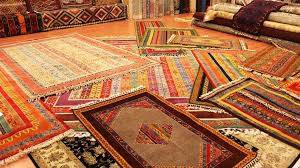LAHORE - The acute shortage of electricity, bad law and order, ever-soaring inflation, shortage of skilled labour force and high mark-up rate during last one decade are the major reasons, hitting the handknotted carpet industry hard, besides causing huge decline in rugs exports.
Experts said that growing use of tiles at domestic as well as commercial level has not seriously affected the production or usage of locally handmade carpets.
Friends of Economic & Business Reforms President Kashif Anwar, who is also former vice president of LCCI, observed that tiles are long lasting, durable, easy to clean and pro-health, as health conscious people are now avoiding the use of carpets at their homes.
He said that people now prefer tiles instead of carpets due to dampness in their homes particularly in walled cities. Moreover doctors also recommend to the health conscious people not to use carpets, which cause different types of allergies.
Kashif Anwar said that local carpet industry is in dire need of the government help to revive this ailing sector, besides helping 0.5 million unemployed people to return to work. He highlighted that because of global recession and declining exports, the industry needs some concession from the government side in areas of credit financing and bank loans. Carpet sector had remained one of the main export sectors earlier. About 1.5 million people are affiliated with the industry, he added. He proposed that by holding special exhibitions for the carpet industry, the exports could get a huge relief. He blamed shortage of skilled labour, inefficiency of foreign trade missions and high cost of doing business in Pakistan for the crisis that the industry is presently undergoing.
LCCI former president said that carpet business is very challenging as it faces a tough competition from India in the global arena and the cost of production in this business is constantly going up.
Kashif Anwar said that there are some traditional workers of carpet manufacturing industry in Khyber Pakhtunkhwa, interior Sindh and Punjab, who need proper training and financing to maintain proper supply chain of the product, he proposed. This small-scale manufacturing will not only improve supply side but will also create employment opportunities in small towns.
Pakistan Carpet Manufacturers and Exporters Association former chairman Maj (r) Akhtar Nazir, expressing concerns over massive decline in carpet exports, said that decline is primarily caused by foreign travel advisory, who are unable to convince the buyer to visit Pakistan, coupled with disturbed supply line. Small-scale factories in rural areas could help a lot to give a boost to the industry, he said.
Pakistan Carpet Manufacturers and Exporters Association former senior vice chairman Qamar Zia was of the view that the non-exploration of new markets, untrained labour and high interest rates are a few from the multiple reasons dogging the carpet sector. He said that the lack of infrastructure, technology and non-availability of carpet institutes were damaging the whole industry and the government should immediately divert its attention towards these issues so that the industry, which retains over 1.5 million poor workers, could be brought out of crisis.
It is also a major source of employment in the rural areas but the government quarters concerned are not taking interest in this regard, and therefore, the industry is facing a serious shortage of labour as 80 per cent of its total workforce comprising Afghan refugees has repatriated to their homeland and there is a dire need for this sector.
All Pakistan Ceramic Tiles Manufacturers Association (APCTMA) spokesman said that like the carpet industry the local tile industry has also been hit by huge influx of smuggled tiles and imports at lower valuation, which capture approximately over 40 percent of the country’s tile market of nearly Rs80 billion while domestic manufacturers continue to suffer owing to their higher production costs and uneven competition from cheaper imported products. He said that increase in customs duty on more than 5,000 items and in regulatory duty of over 900 items should have been levied only on luxury items and not on imported raw materials and capital goods which are not produced locally.
SALMAN ABDUHU






